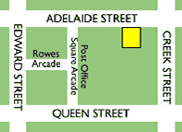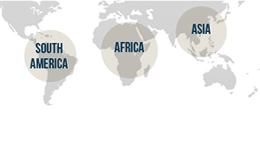The Shopping Bags Dilemma
January 2nd, 2013Update
On 1st July 2018, Qld will ban light plastic bags
We encourage our patients to bring their own bags but meanwhile we will have available Paper bags for purchase for $1. As noted below they are not a great solution. The small medical kit bag only costs $5 so it may be preferable to get a proper kit bag instead, which can be used many times.
Original Blog post from 1 Jan 2013
Today I want to talk about shopping bags – slightly off travel medicine, but travel is about luggage so it is somewhat related.
Our clinic has used our last supply of pre printed paper shopping bags, so I thought I would review the shopping bag issue, and decide what sort of shopping bag or ‘carry bag’ we should give to our customers when they need them.
Now I know, that some would say, the best choice for solving the shopping bags dilemma is not to buy anything, but that is not entirely practical.
The next best answer to the shopping bags dilemma is, perhaps, for everyone to carry their own shopping bags. However in our business, often people do not have a bag with them. We don’t want our customers trying to juggle medication boxes, hand wash, mosquito repellent, vaccination books etc as they walk the streets. We need to provide something.
I thought a quick Google search would advise me of the most environmentally sound choice, but alas, it was not to be. The search term ‘Best Shopping Bag’ returned about 215,000,000 results.
The first entry, although it mentioned the need to help the planet, was a buying guide to how to find the best reusable shopping bag – more of a fashion article really.
Wikipedia had a great entry with lots of information ( if you trust it – which I have to confess I do find it quite useful for general knowledge in areas away from my expertise )
A Wall Street Journal article from 2008 ‘ The inconvenient bag’ reinforced that I am not alone in my difficulty in choosing the most environmentally friendly means to carry merchandise home from the shops.
The choices for type of shopping bag are many, and each source ( of course ) advocates theirs as the best choice.
Many espouse the use of reusable fabric ( especially cotton) carrier bags. They may even sell ones with groovy green slogans. However experts tell us these bags need to be used every working day for a year in order to justify the costs of manufacture. Most people dont use them that often ( 51 is the reported average). I wonder how many cotton bags are gathering dust in cupboards? Cotton bags also need to be washed, especially the grocery bags, or they can harbour bacteria and potentially give the environmentally careful shopper an unpleasant dose of food poisoning.
Some manufacturers are making carry bags from 100% recycled PET bottles – these can be fully recycled through a household’s standard recycling bin. Recycling plastic takes quite a bit of energy so these bags also need to be used many times to make it worth the energy to make them.
Some reusable bags that look like fabric are actually “nonwoven polypropylene, a form of plastic that requires about 28 times as much energy to produce as the plastic used in standard disposable bags and eight times as much as a paper sack, according to Mr. Sterling, of Natural Capitalism Solutions.” ( from Inconvenient bag article noted above )
Paper bags are also said to be a problem. Manufacturing the paper bags requires a lot of trees, four times more energy to manufacture them compared to plastic, and generates 70 percent more air and 50 times more water pollutants than manufacturing plastic bags. They are also heavier to transport, – especially an issue if the bags are made in china and shipped to Australia. The report below found that paper bags have to be used at least 4 times to justify their environmental footprint…and what if they get wet?
We have the option of compostable bio bags – made from things like cornstarch – great if you are composting food waste but a bit fragile for day to day merchandise.
There are also plastic bags that break down into tiny pieces of plastic but they are still plastic, which may not be a bad idea – better than whole bags floating in the ocean and throttling wildlife.
The common plastic bag has indeed been treated as a bad guy for years. They occasionally make their way into the oceans and we read stories of the great pacific rubbish patch and of turtles strangled by plastic bags, and baby albatross dying their stomachs full of plastic. No one I know wants to be inadvertently killing baby albatross! (Try googling “photo plastic waste” for some amazing pictures.)
However, detailed new research from the Environmental Agency in the UK suggests that plastic bags are not the eco villans we once thought, because reusable bags have a cost for the planet to provide, and they often don‘t get re-used often enough to justify the water, air, and effort that goes into making them, and the energy etc transporting them and even cleaning them.
I also wonder whether our customers really need us to have our logo on their bags, as it just increases the costs to the customer. Expensive bags cost money to the customer. We try to keep our costs down, so we can provide our service more economically to our travellers. I would like to think our travellers remember us for our good service, not for our shopping bags. Printing logos etc on the bag would also use more environmental resources ( paper to prepare artwork, inks have to be manufactured and put on the bag etc ) which seems a waste, when it is destined for the bin. Research suggests the best use of these “single use” plastic bags is as bin liners, so they are used at least one more time and also enter the rubbish stream go and not the sea.
This article seems to say it best,: All bags have an impact. The best solution would be to use a cotton bag several hundred times, probably using it constantly for years. If you are not going to do that, a plastic bag – re-used as a bin liner – is the next best option, better than paper. Avoid accepting a plastic bag unless you need one.
So for the moment, we will be giving out unmarked plastic bags to those who ask for them.
I would be really interested in comments or feedback from our customers or others.



